What is manufacturing CRM?
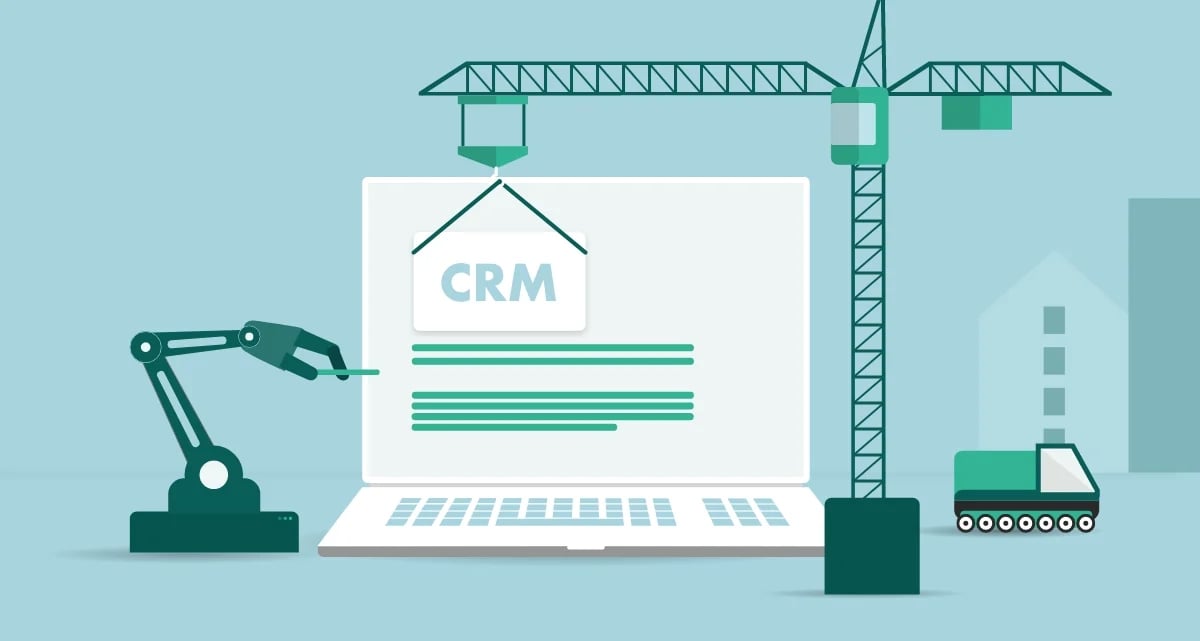
Implementing CRM in the manufacturing sector has been proven to enhance sales performance and return on investment (ROI), all while mitigating customer churn rates. A CRM solution designed specifically for the distribution and manufacturing industries empowers businesses to effectively manage customer relationships and data, aligning with their unique requirements.
Opting for the top CRM software tailored for manufacturing enables you to elevate customer engagement, drive sales growth, and refine customer support and marketing tactics for optimal outcomes.
CRM systems presented below are market leaders. We advise you to pay attention to them to get an all-in-one solution:
How CRM software is used in the manufacturing industry?
Customer Relationship Management (CRM) software is used in the manufacturing industry to streamline various aspects of customer interactions, sales processes, inventory management, and overall business operations.
CRM software in manufacturing streamlines sales pipeline tracking, quoting and pricing, opportunity management, customer support, and marketing campaigns. It centralizes customer data, assists in lead management, generates quotes, forecasts revenue, tracks customer inquiries, and executes targeted marketing efforts.
Overall, CRM software solutions enhance efficiency, boost sales, and improve customer satisfaction in the manufacturing sector.
[Related article: 7 Best Simple CRMs for 2024 - Easy & Basic CRMs]
Why is a CRM system important in manufacturing?
Through your manufacturing CRM, you can automate the delivery of personalized emails to customers, leveraging their interactions with your business. Furthermore, by segmenting your customer information, you allow your sales team to concentrate their efforts on the most qualified leads.
Moreover, with a CRM for manufacturing companies, you can provide customers with a dedicated portal. This portal enables them to conveniently access various services, including viewing their purchase history, tracking orders, and submitting support tickets.
How CRM beneficial for manufacturing

Improved closing rates
Implementing a CRM system enables you to concentrate all sales interactions into a single platform. This ensures that your sales team can efficiently manage accounts, leads, opportunities, and communications without missing out on any potential deals. By having well-documented information about leads and clients readily available, you can build stronger relationships based on trust and respect, ultimately increasing your chances of closing deals with both new and existing customers. A more organized sales team and a streamlined sales pipeline lead to improved sales performance and a higher number of closed deals.
Elevated customer satisfaction and strengthened loyalty
A CRM for the manufacturing industry isn't just beneficial for attracting potential customers; it's also essential for nurturing relationships with existing ones. By utilizing the information stored in your CRM, you can communicate more effectively and regularly with your customers. Access to comprehensive customer and job information enables you to respond promptly and accurately to customer inquiries, leading to heightened satisfaction and loyalty. This translates into increased repeat business and a loyal customer base that consistently chooses your products or services.
Enhanced demand forecasting capabilities
Utilizing a CRM system enables your sales team to forecast future sales growth based on the pipeline of potential deals. With a clear understanding of all potential opportunities, you can anticipate upcoming orders and plan accordingly. Real-time sales forecasts provided by the CRM allow for better planning, scheduling, and resource allocation within your organization. Improved production planning ensures smoother operations and timely delivery of orders, ultimately driving customer satisfaction and loyalty.
Amplified supply chain visibility
A CRM for manufacturers provides valuable insights into managing your supply chain effectively. By integrating sales forecast data with operational insights from your ERP system, you gain a comprehensive understanding of your supply chain. This increased visibility, often known as an "intelligent supply chain," enables you to optimize production schedules, inventory levels, and procurement procedures. With better supply chain management, you can ensure timely delivery of products, minimize disruptions, and maintain customer satisfaction.
Advancements in product quality
A CRM system enables you to gather valuable feedback from customers regarding your products, allowing you to identify areas for improvement in quality and consistency. By establishing direct lines of communication with your customers, you can receive real-time feedback and insights into their preferences and needs. This feedback loop facilitates rapid and effective adjustments to your products, leading to continuous improvement and enhanced customer satisfaction.
Increased sales and ROI
Implementing a CRM for a manufacturing company often leads to a significant boost in sales and ROI. By centralizing sales conversations and data within a CRM platform, businesses can effectively manage accounts, leads, opportunities, and communications.
This holistic approach minimizes the risk of missed deals or overlooked opportunities, ultimately resulting in more closed deals and higher sales figures. Furthermore, a CRM system delivers useful insights into customer preferences and behaviors, enabling businesses to tailor their sales and marketing efforts more effectively. By targeting the right leads with personalized messages and offers, businesses can increase their conversion rates and drive higher sales volumes.
[Related article: How to Measure ROI for CRM Marketing? Simple Guide with Formula & Examples]
Top 10 best CRM for the manufacturing industry
1. Zoho CRM
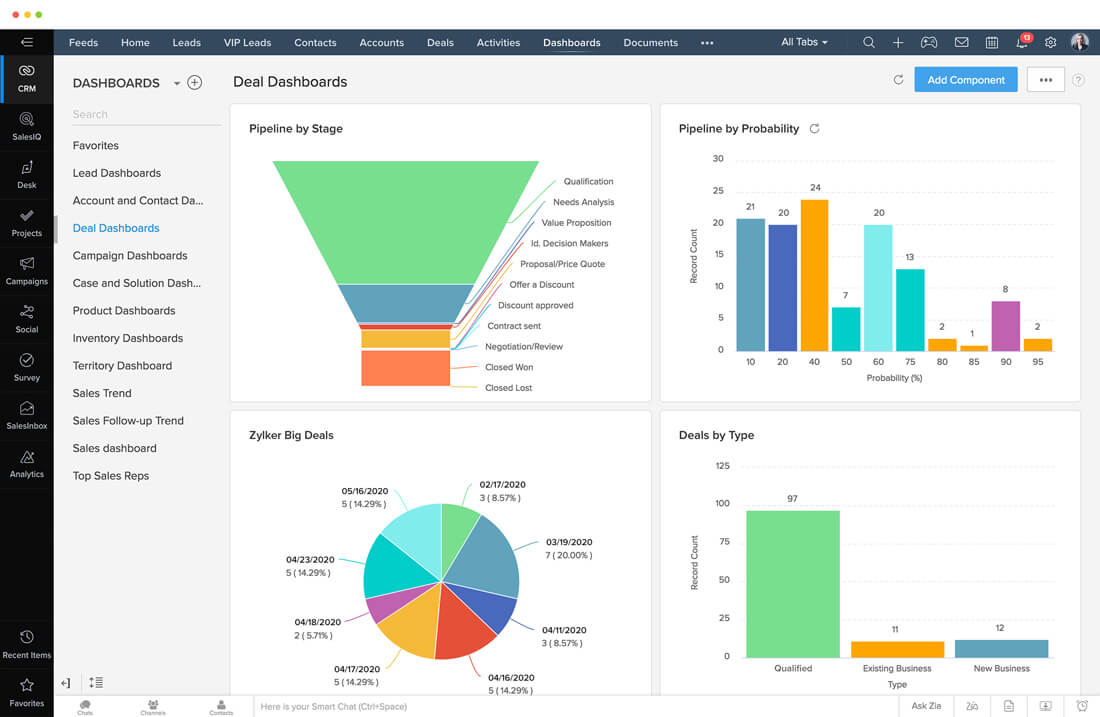
Zoho CRM is an affordable yet thorough package designed specifically for manufacturing. Boasting modules for sales, marketing, and customer support, this CRM for manufacturing positions itself as the go-to software for manufacturing experts. Its robust workflow automation features streamline various manufacturing operations, while its analytical tools offer valuable insights.
Key Features:
- Lead Management
- Reporting and Dashboards
- Workflow Automation
- Analytics
- Multi-channel Communication
- Customization Options
Pros:
- Cost-effective pricing
- All-encompassing suite
- Streamlined workflow automation
- Multi-channel communication
Cons:
- The learning curve may be steep
- Limited customization in the free plan
Pricing:
- Free plan for 3 users
- Standard: €14 per user per month, billed annually
- Professional: €23 per user per month, billed annually
- Enterprise: €40 per user per month, billed annually
- Ultimate: €52 per user per month, billed annually
2. Pipedrive
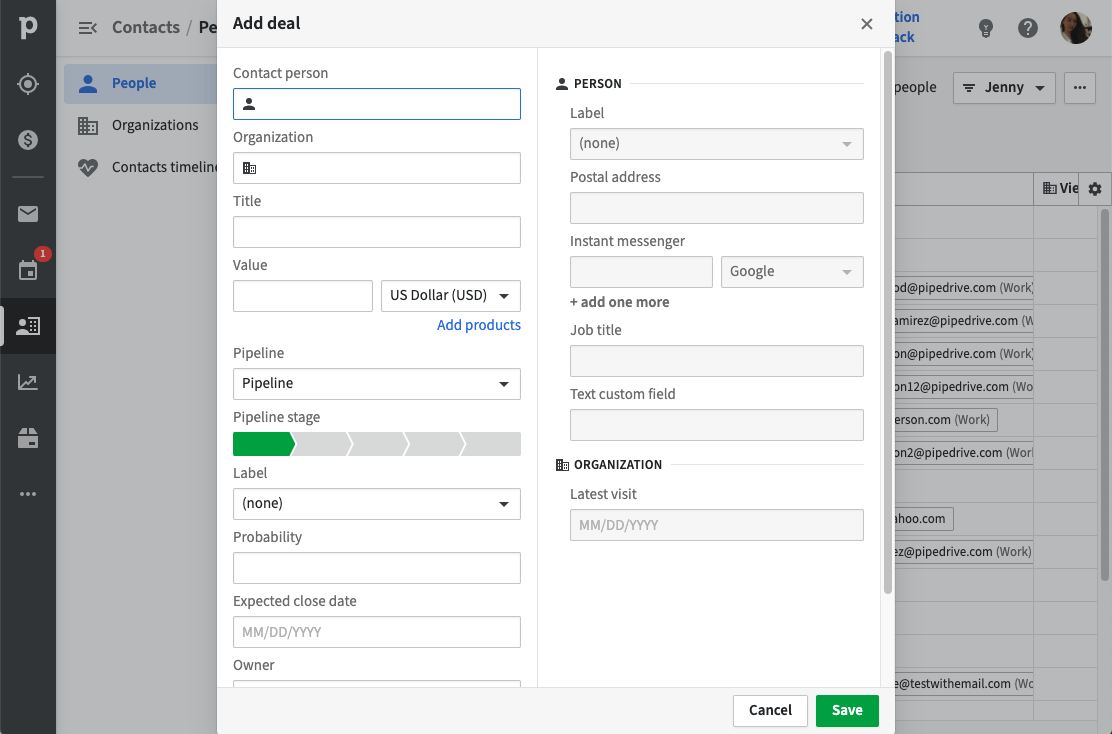
Pipedrive is a top-notch CRM choice for manufacturing enterprises. Its automation tools enhance operational efficiency, while robust reporting functions empower users to monitor and analyze sales performance. While its focus lies on managing pipelines, Pipedrive also provides integration with popular third-party apps.
Key Features:
- Pipeline Management and Customization
- Automation Tools
- Sales Reporting and Analytics
- Deal Tracking
- Email Integration
Pros:
- Efficient sales pipeline management
- Intuitive user interface
- Powerful automation
- Comprehensive reporting capabilities
- Integration flexibility
Cons:
- Limited built-in marketing features
- Interface may seem overly simplistic
Pricing:
- Essential: $14 per user per month, billed annually
- Advanced: $29 per user per month, billed annually
- Professional: $49 per user per month, billed annually
- Power: $64 per user per month, billed annually
- Enterprise: $99 per user per month, billed annually
3. ClickUp
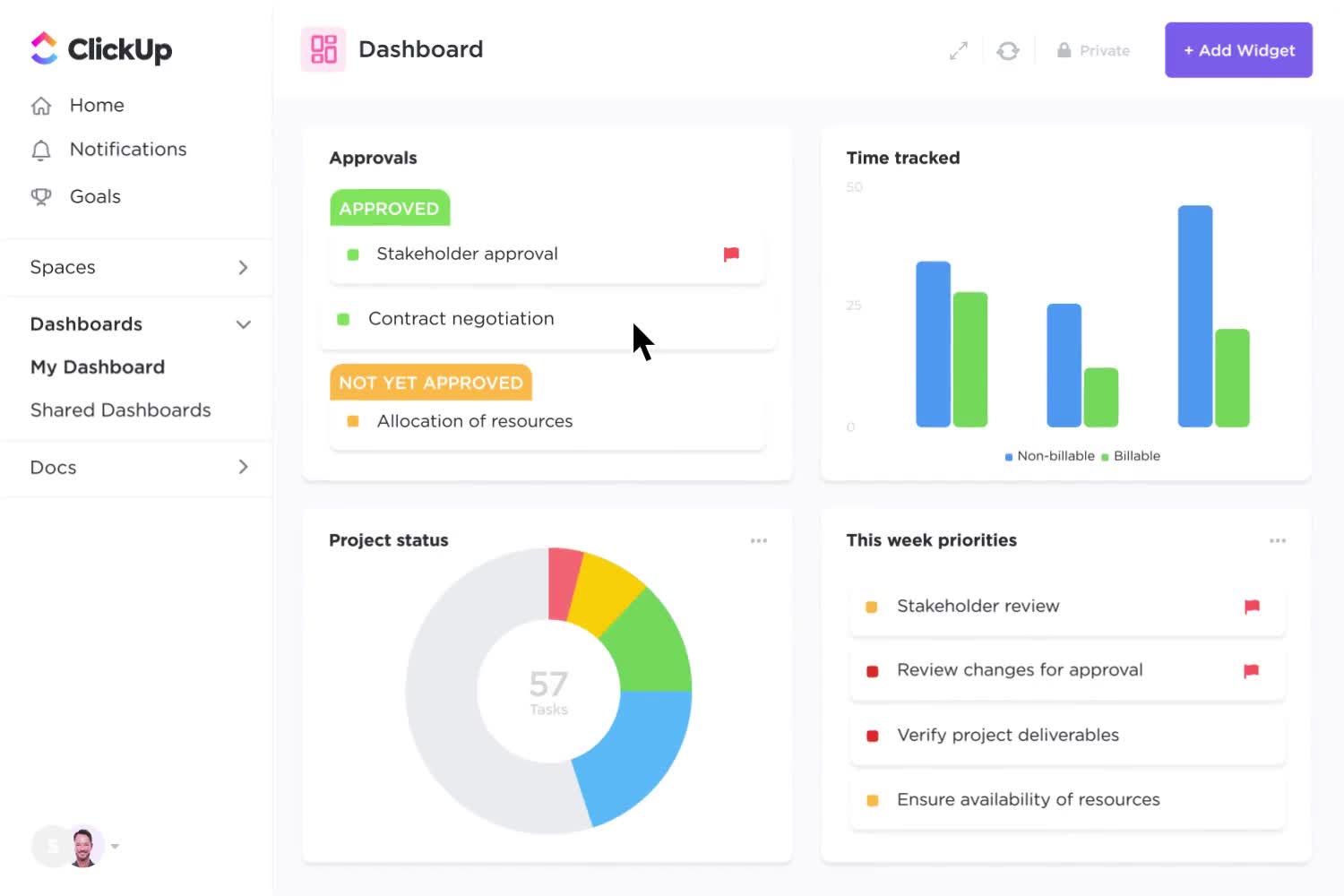
ClickUp is a robust force in project management, tailor-made for fostering collaboration in manufacturing. Its rich array of project management tools caters to manufacturing businesses with varied teams and projects, ensuring every aspect is covered. The customizable workspace adapts seamlessly to the unique workflows of manufacturing, guaranteeing flexibility.
With collaboration tools that promote teamwork, ClickUp is a versatile solution for manufacturing firms striving for efficient project management alongside CRM capabilities.
Key Features:
- Project management and Automation
- Collaboration Tools
- Document Management
- Resource Management
- Integrations with other apps
Pros:
- Extensive project management functionalities
- Tailor-made workspace options
- Enhanced integration capabilities
- Intuitive user interface
- Team collaboration features
Cons:
- A steeper learning curve for those new to project management
Pricing:
- Free plan
- Unlimited: $7 per member per month, billed annually
- Business: $12 per member per month, billed annually
- Enterprise: Contact the vendor
[Related article: monday vs Clickup - Which to choose?]
4. Freshsales
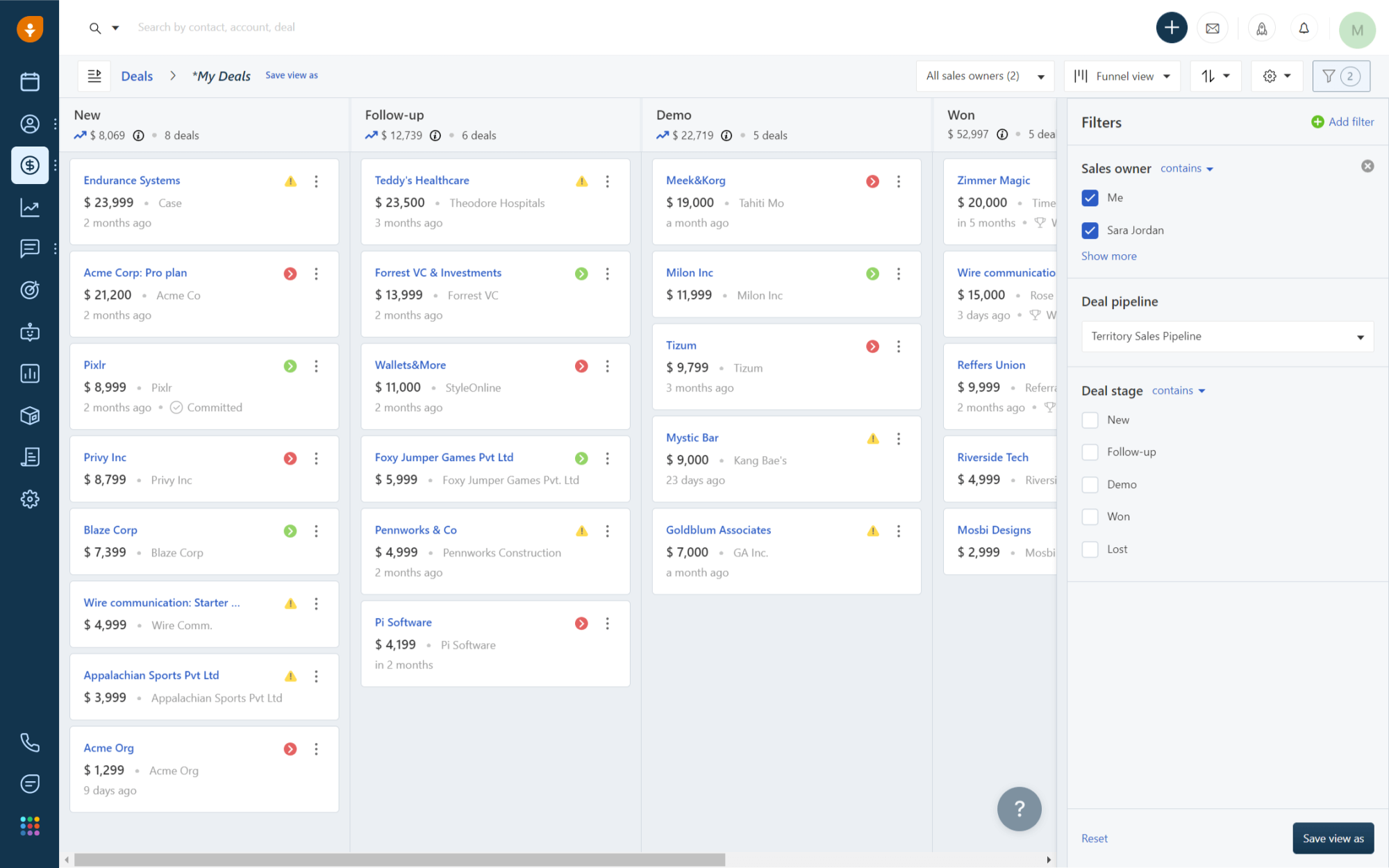
Freshsales is a user-friendly CRM platform designed to assist manufacturing companies in handling customer data and streamlining workflows. Its intuitive design has made it a favored option among small to medium-sized businesses seeking the best CRM for a small manufacturing business.
Key Features:
- Tailorable Pipelines and Dashboards
- Automated Lead Capture
- Lead Scoring
- Integration of Phone and Email Functionalities
- Advanced Reporting and Analytics
- Mobile Application
Pros:
- Intuitive interface
- A wide range of customization options
- Mobile apps for iOS and Android devices
Cons:
- Restrictions on custom fields and workflows in lower-tier plans
- Some users have experienced sluggish performance with the mobile app
Pricing:
- Free plan for up to 3 users
- Growth: $9 per user per month, billed annually
- Pro: $39 per user per month, billed annually
- Enterprise: $59 per user per month, billed annually
5. Thryv
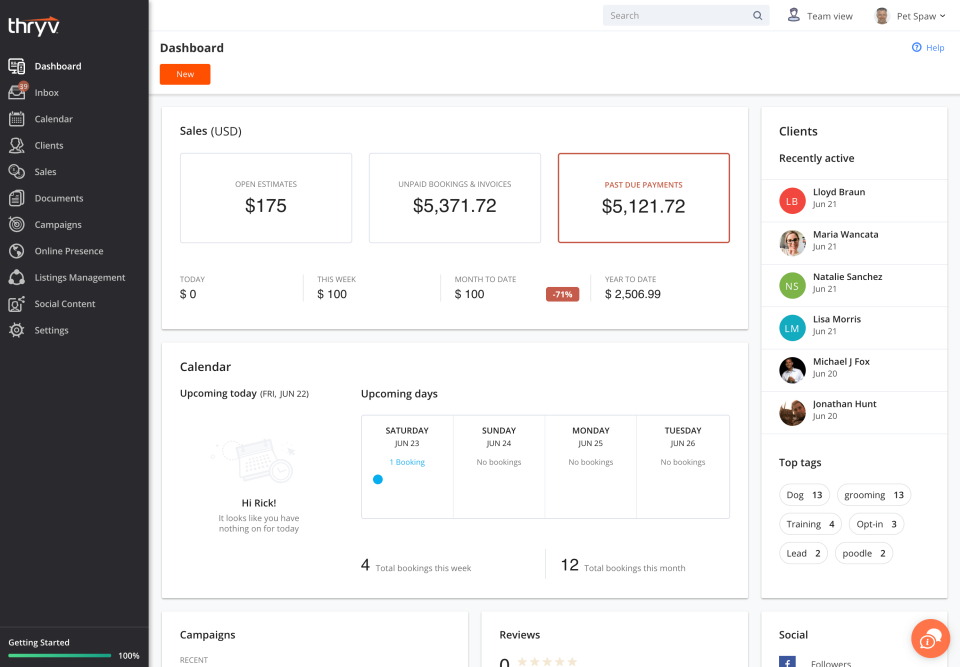
Thryv is a comprehensive CRM solution tailored for manufacturers, providing essential features such as appointment scheduling, payment processing, and email marketing. This CRM software for the manufacturing industry seamlessly integrates with well-known platforms like QuickBooks and Outlook, enabling businesses to efficiently manage various aspects from a single hub.
Key Features:
- Appointment Scheduling
- Payments Processing
- Email Marketing Tools
- Customer Interaction Management
Pros:
- Consolidated tools catering to diverse business requirements
- Responsive and supportive customer service team
- Enhanced customer engagement across multiple channels
Cons:
- The mobile app may occasionally encounter problems
- In comparison to other CRMs, the customization choices are fairly limited
- Lack of a built-in calling feature
Pricing:
Thryv Business Center:
- PLUS: $199 per month per location
- PROFESSIONAL: $349 per month per location
- UNLIMITED: $499 per month per location
[Related article: Thryv CRM: A Comprehensive Overview, Pros and Cons, Pricing, and More [2024]]
6. Maximizer CRM
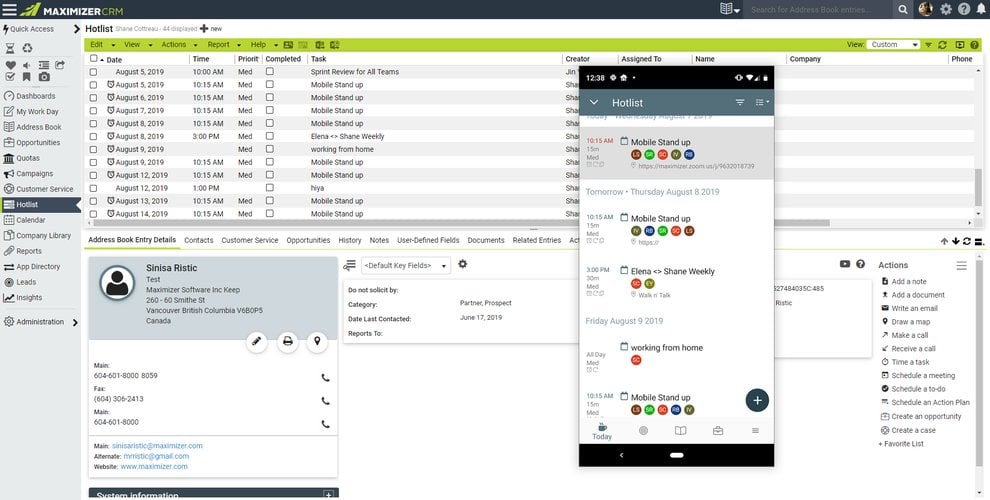
Maximizer CRM is a cloud-based solution designed to empower businesses to manage their sales, marketing, and customer service tasks efficiently. Positioned as an ideal CRM option for manufacturing, it equips teams with a plethora of tools to enhance productivity, improve customer interactions and drive revenue growth.
Key Features:
- Customizable Dashboards
- Lead Capture
- Lead Management
- Built-in Telephony Feature
- Integration with Microsoft Outlook
- Mobile Application
Pros:
- Consolidation of sales data, facilitating centralized management and analysis
- Continuous improvement of sales teams through ongoing monitoring and optimization
- Informed decision-making enabled by customizable reporting features
Cons:
- Limited customization options for generating reports
- An outdated user interface
Pricing:
- Base Edition: €58 per user per month, billed annually
- Sales Leader Edition: €63 per user per month, billed annually
7. Keap
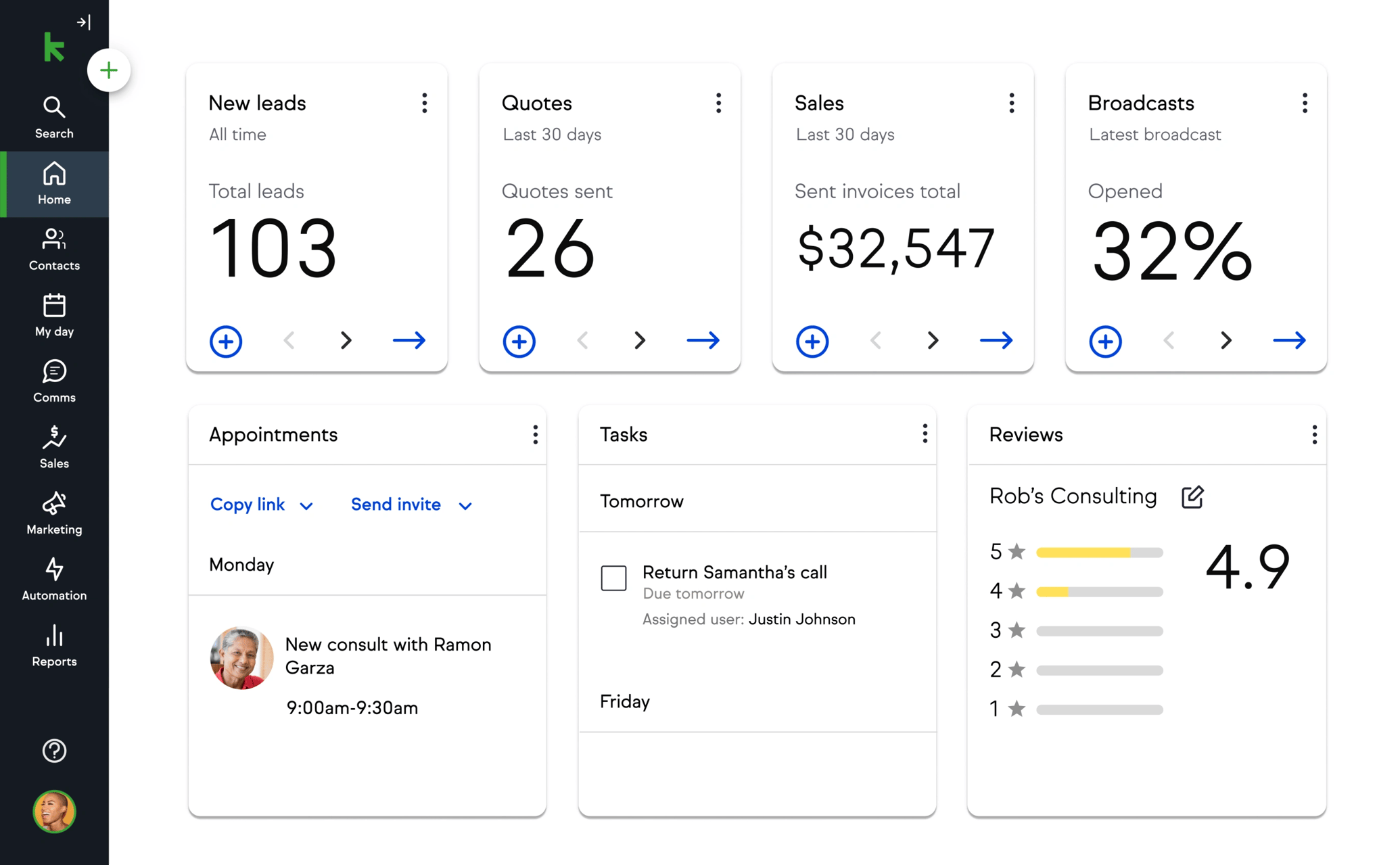
Keap CRM presents itself as the go-to solution for boosting manufacturing efficiency through automation. With its strong automation features, this best CRM for manufacturing business simplifies various sales and marketing tasks, making it a prime choice for manufacturing experts looking to streamline their operations. Its expertise in contact management ensures that vital customer information is centralized, fostering stronger manufacturing relationships.
Key Features:
- Contact Management
- Sales and Marketing Automation
- Lead Scoring and Segmentation
- Workflow Automation
- Appointment Scheduling
- Invoice and Payment Processing
Pros:
- Powerful automation capabilities
- Comprehensive all-in-one platform
- Effective contact management
- Streamlined customer communication
- Seamless integration with e-commerce platforms
Cons:
- Overwhelming interface for newcomers
- Advanced features available in higher-tier plans
Pricing:
- Pro: $159 per month, billed annually
- Max: $229 per month, billed annually
- Ultimate: $279 per month, billed annually
8. EngageBay
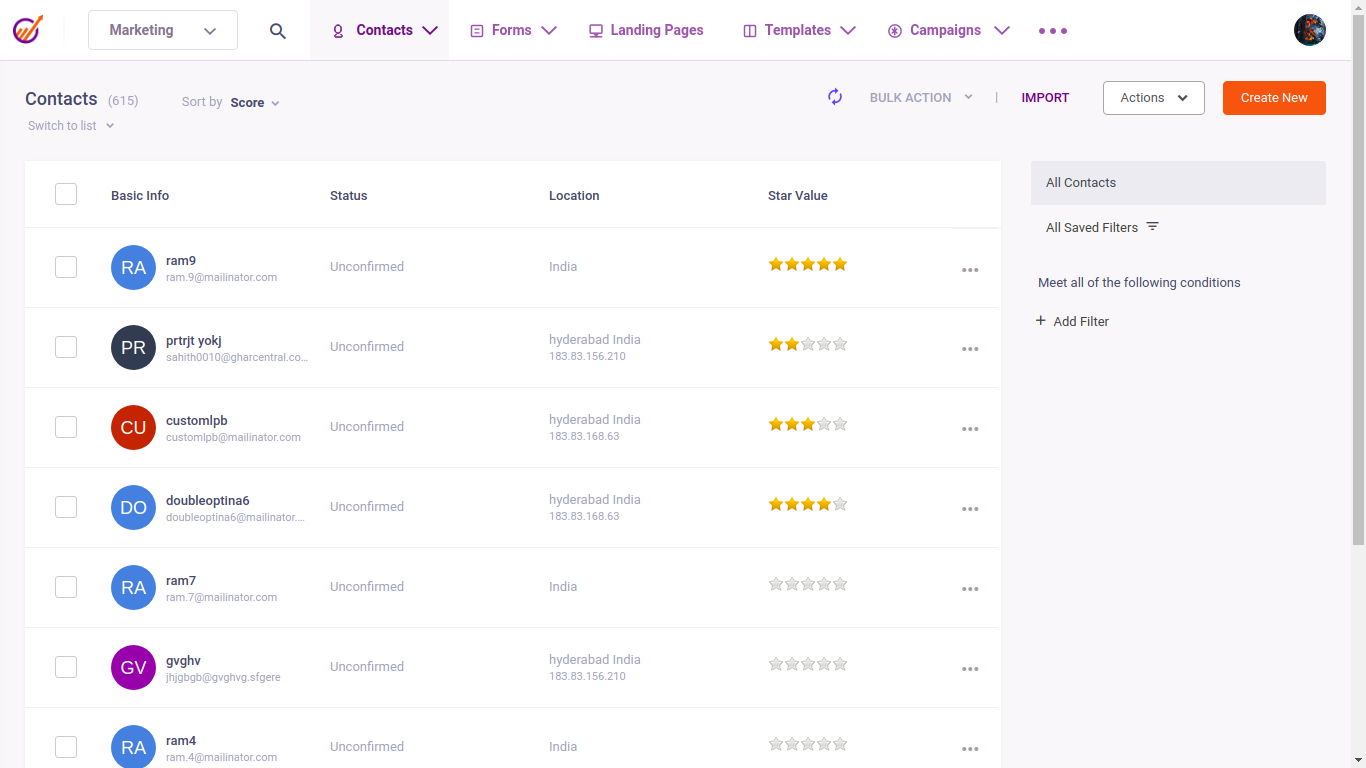
EngageBay is a CRM solution for driving growth in the manufacturing sector, offering an integrated platform tailored for marketing, sales, and service needs. Designed to cater to manufacturing companies, its affordability, particularly for small to medium-sized businesses, makes it an attractive CRM for the manufacturing business. Customizable workflows adapt to specific manufacturing processes, while robust email marketing features enhance communication strategies.
Key Features:
- Email Marketing and Automation
- Contact Management
- Landing Page Builder
- Sales Pipeline Management
- Task Management and Reminders
Pros:
- Comprehensive all-in-one platform
- Affordable pricing suitable for various business sizes
- Customizable workflows to adapt to unique manufacturing processes
- Effective email marketing capabilities
Cons:
- Limited availability of third-party integrations
- Advanced features restricted to higher-tier plans
Pricing:
- Free plan
- BASIC: $13.79 per user per month, billed annually
- GROWTH: $59.79 per user per month, billed annually
- PRO: $110.39 per user per month, billed annually
9. Hubspot
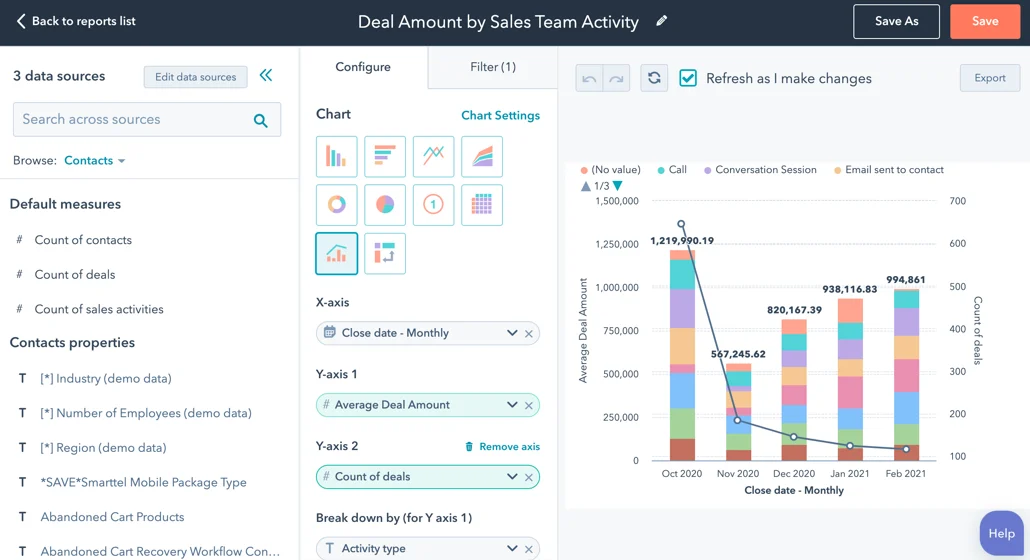
Hubspot CRM is an excellent choice for manufacturers and sales teams seeking an affordable and intuitive CRM solution. With its integration capabilities and automated functionalities, this CRM software can effectively assist businesses in lead generation, saving time, and improving overall sales and marketing efforts.
Key Features:
- Integration with other Hubspot tools
- Customizable Dashboards and Reports
- Lead Capture
- Lead Generation
- Marketing Automation Workflows
- Sales Automation and Sequences
- Reporting and Analytics
Pros:
- An intuitive user interface ensures ease of use
- Customization options
- Marketing automation features
- Task automation capabilities streamline workflows and improve productivity
Cons:
- A steep learning curve for new users
- Overwhelming features for small businesses or teams
Pricing:
Sales Hub:
- Free plan for up to 5 users
- Starter: $15 per user per month, billed annually
- Professional: $90 per user per month, billed annually
- Enterprise: $150 per user per month, billed annually
[Related article: HubSpot Alternatives and Competitors: Top 7 in 2024]
10. Salesmate
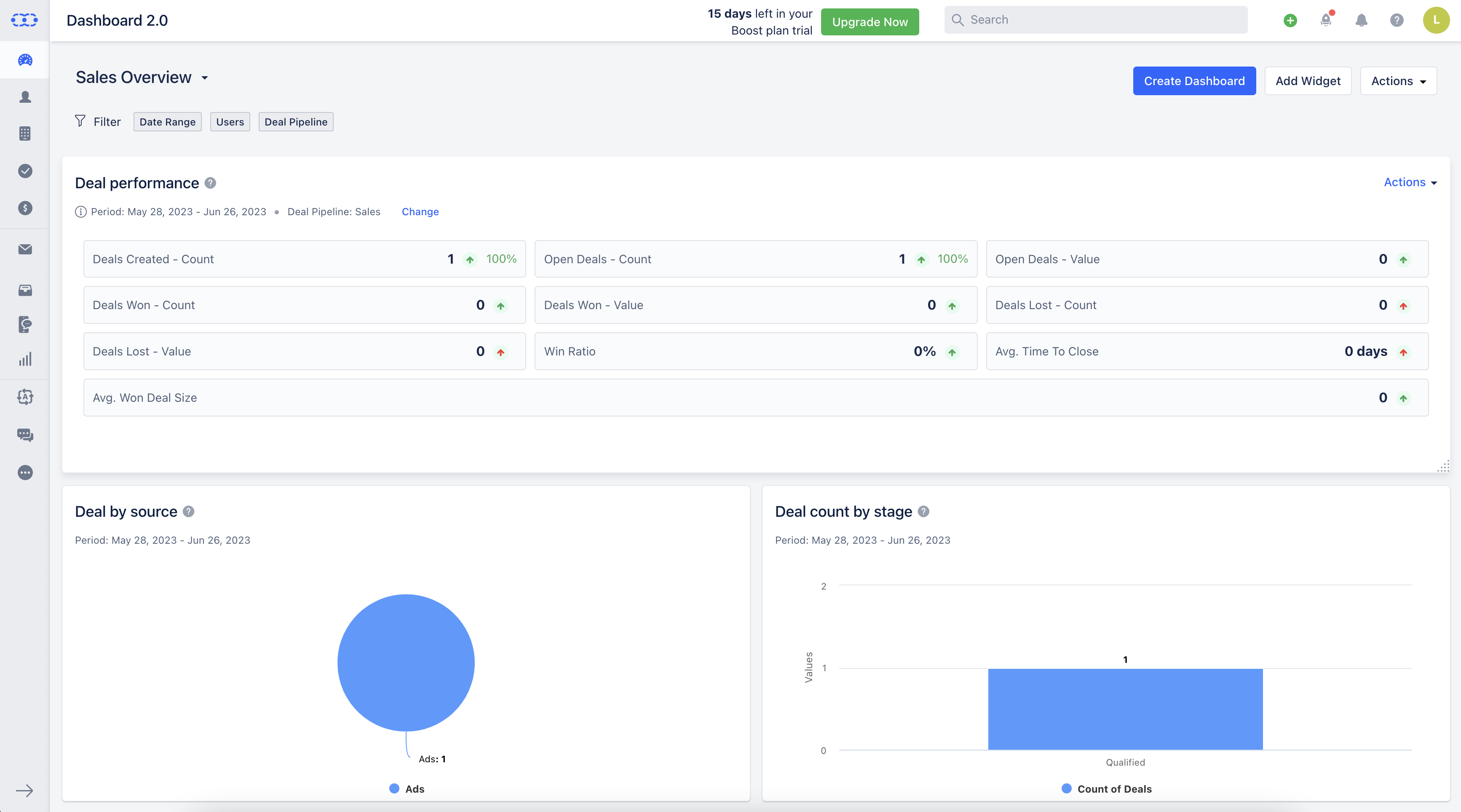
Salesmate is a CRM platform specifically created to refine manufacturing processes, aiming for precision and efficiency. Its user-friendly interface ensures smooth navigation, particularly beneficial for users navigating complex manufacturing workflows. With robust automation features, this CRM in the manufacturing sector streamlines sales processes, reducing manual tasks and enhancing productivity.
Key Features:
- Sales Automation and Pipeline Management
- Built-in Calling and Texting
- Power Dialer
- Marketing Automation
- Live Chat Support
Pros:
- User-friendly interface promotes ease of use
- Automation features enhance efficiency
- Seamless integration capability simplifies workflow
- Customizable dashboards cater to specific needs
- Mobile accessibility ensures convenience on the go
Cons:
- The learning curve may be steep for advanced features
- Limited availability of third-party integrations
Pricing:
- Basic: $23 per user per month, billed annually
- Pro: $39 per user per month, billed annually
- Business: $63 per user per month, billed annually
- Enterprise: Contact the vendor
Key features to seek in a manufacturing CRM

When choosing a CRM solution customized for the distribution and manufacturing sectors, consider the following critical factors:
1. Adaptability
Tailoring the software to align with your company’s specific requirements is vital for a successful CRM implementation in the manufacturing industry. It's crucial to have the flexibility to adjust workflows, create custom fields, and modify functionality as necessary. The more customizable CRM software is, the better it can cater to your unique business needs.
2. Personalization
After identifying configurable CRM software for the manufacturing industry, ensure it offers robust customization options. This involves the ability to personalize the user interface (UI) and user experience (UX) to suit your company’s preferences. You should have the freedom to customize elements such as colors, fonts, logos, and layout. The best CRM solutions for the manufacturing industry also provide tools for creating custom reports and dashboards tailored to your specific metrics and KPIs.
3. Integrations
It's important to select a solution that works perfectly with your current manufacturing software stack. Valuable integrations include accounting software like QuickBooks and email campaign management tools. By integrating your CRM with other essential systems, you may improve data accuracy, streamline procedures, and increase overall efficiency within your firm.
How to choose the best CRM software for manufacturing business?
Selecting an effective CRM for the manufacturing business involves careful consideration of various factors to ensure it aligns with the unique needs and objectives of the industry:
- Consider marketing and sales, customer support, and integration requirements.
- Look for CRM solutions tailored for manufacturing, and evaluate features and reviews.
- Choose a CRM that can be tailored to your workflows and processes.
- Select a CRM that seamlessly integrates with your existing software.
- Opt for an intuitive platform that your team can easily adopt.
- Ensure the CRM is accessible on mobile devices for flexibility.
- Look for robust reporting and analytics features for insights.
- Select a versatile solution that can expand with your company.
- Look for responsive support and training resources.
- Test the CRM with your team before making a final decision.
Wrapping Up

In conclusion, implementing a CRM system tailored for manufacturing businesses offers numerous benefits, including enhanced sales performance, improved customer satisfaction, streamlined operations, and increased profitability. By choosing the right CRM solution and leveraging its capabilities effectively, manufacturing companies can achieve greater efficiency, competitiveness, and success in this market.


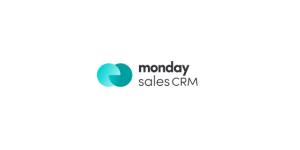

.png)




